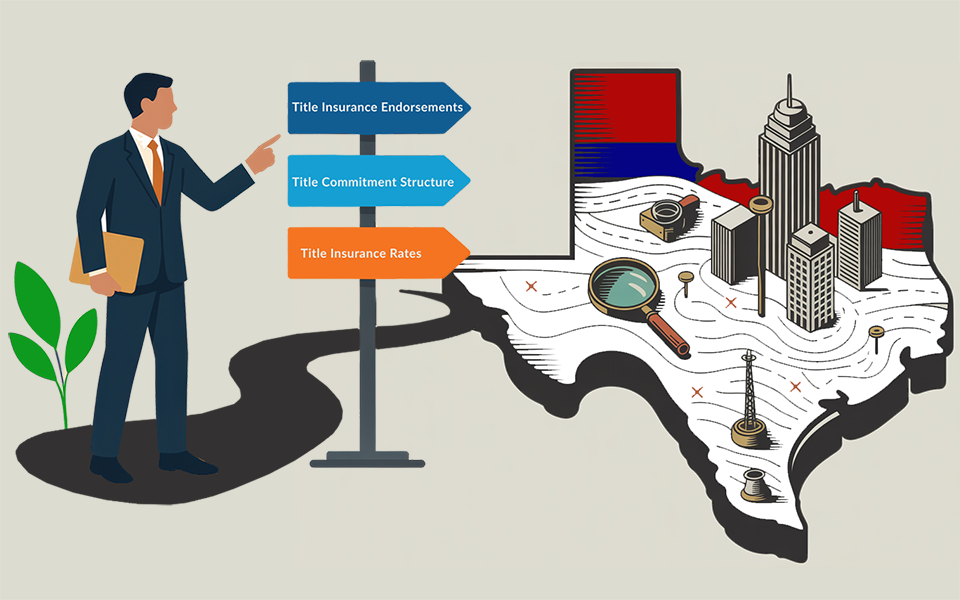FinCEN Compliance Reporting Services — Be Ready Before March 1, 2026 Learn More →
December 22, 2025
Title Industry 2.0: Harnessing AI, Data, and Cybersecurity for a Resilient Future

The title industry is at a crossroads. Traditional methods that have served us well for decades now face mounting challenges in an increasingly digital world. Rising cyber risks, complex data streams, and a need for greater efficiency have spurred the search for innovative solutions. This article explores how artificial intelligence (AI), data analytics, and cybersecurity are changing our work and paving the way for a more resilient title insurance landscape. This isn't just theory—it's a practical roadmap drawn from real-world experience.
Over the past few years, technology has quietly reshaped our industry. Intelligent systems are replacing legacy processes that once relied on manual checks and paper trails. These systems streamline underwriting, enhance title searches, and improve risk management. The transition to "Title Insurance 2.0" isn't about discarding old practices overnight; it's about integrating new tools that complement our established methods while boosting speed and accuracy.
In the following sections, we'll break down the transformative impact of AI, data analytics, and cybersecurity on the title industry. We'll also introduce a detailed case study from a Florida-based client and discuss regulatory considerations when adopting these new technologies.
The Digital Transformation of Title Industry
The title indsutryhas long depended on meticulous research and thorough document reviews. Traditionally, professionals would spend countless hours sifting through public records to ensure every property title was free of encumbrances. Although this method has worked in the past, it is both time-consuming and vulnerable to human error.
Today's fast-paced real estate market demands quicker turnaround times without sacrificing accuracy. Digital transformation allows for rapid scanning and processing of documents through tools such as optical character recognition (OCR) and natural language processing (NLP). For example, advanced OCR systems can convert physical documents into searchable digital files, enabling title agents to verify details in a fraction of the time. These digital systems also integrate data from multiple sources, offering a holistic view of a property's history—highlighting discrepancies like unresolved liens or disputed easements, thereby enhancing risk management.
This blend of speed and precision is essential for reducing delays that could cost clients thousands of dollars in fees or lost opportunities. The digital transformation of the title industry has led to significant cost reductions, improved service delivery, and higher levels of accuracy. For professionals, this means less manual work and more time to address complex issues, while clients benefit from faster closings and fewer surprises during transactions.
Harnessing Artificial Intelligence
Artificial intelligence is now a crucial tool in our industry. Its capabilities in document analysis and predictive modeling have revolutionized traditional processes.

AI in Underwriting and Title Searches
Modern title companies use AI algorithms—such as convolutional neural networks (CNNs) for image recognition and recurrent neural networks (RNNs) for sequential data processing—to rapidly scan and interpret vast amounts of property data. For instance, AI-driven tools can automatically flag anomalies in title records that might suggest undisclosed liens or ownership disputes. Machine learning models like gradient boosting machines (GBMs) are also employed to predict risk factors based on historical data, improving the precision of underwriting decisions.
Operational Efficiencies and Cost Reduction
One of AI's most immediate benefits is automating routine tasks. Automated document review, powered by NLP algorithms, dramatically reduces processing times. In one study, companies reported that integrating AI reduced document review time by up to 40% while lowering error rates by nearly 30%. This not only cuts labor costs but also allows title agents to devote more attention to complex cases that require human judgment.
Benefits for Stakeholders
The improvements extend well beyond the title agents. Real estate agents, underwriters, and lenders benefit from faster and more accurate title searches. The efficiency gains mean quicker deal closures and fewer unexpected complications, boosting customer satisfaction.
Case Study: Sunshine Title Solutions in Florida
Consider the example of Sunshine Title Solutions, a Florida-based title company. Facing a surge in transaction volumes and mounting backlogs, Sunshine Title Solutions integrated an AI-driven document analysis system using a combination of CNNs for scanning property records and GBMs for risk assessment.
Implementation Timeline & ROI:
- Phase 1 (0-3 months): The company began piloting the AI system on 20% of its transactions.
- Phase 2 (3-6 months): Based on initial feedback, the process was refined, and the system was rolled out company-wide.
- Results: Processing times dropped by 42%, error rates fell by 33%, and operational costs reduced by 28%. These improvements translated to an ROI of approximately 150% within the first year, while client satisfaction scores increased notably as deals closed faster and with greater reliability.
Sunshine Title Solutions now stands as a testament to the practical benefits of AI in title insurance, demonstrating that a calculated digital transformation can yield substantial long-term gains.
Leveraging Data Analytics to Enhance Risk Management
In today's data-rich environment, collecting, analyzing, and acting on information is invaluable. Title insurance companies increasingly rely on data analytics for deeper insights into risk management and underwriting practices.
The Role of Data in Modern
Modern systems capture a vast array of data—from historical property records to fraud trends. Companies can detect trends and patterns that might go unnoticed by employing tools such as Tableau for data visualization and Apache Hadoop for managing big data. For example, an analytics platform might reveal that specific neighborhoods consistently exhibit higher undisclosed liens, prompting more thorough checks in those areas.
Improving Underwriting Accuracy and Fraud Prevention
Data analytics enables title companies to improve underwriting accuracy. Predictive models built on historical transaction data can forecast potential risks, while anomaly detection algorithms help spot irregularities that may indicate fraud. In one instance, a firm reduced overlooked liens by 25% over six months using advanced trend analysis to refine their underwriting criteria.
Insights for Related Stakeholders
All parties involved feel the benefits of data analytics. Real estate agents gain access to detailed market trends, underwriters can fine-tune risk profiles, and lenders are better equipped to assess potential claims. This level of transparency improves negotiations and helps all stakeholders arrive at more informed decisions.
Strengthening Cybersecurity for Title Operations
As we embrace digital transformation, robust cybersecurity becomes paramount. Title companies handle vast amounts of sensitive data—from personal records to detailed property histories—which makes them prime targets for cyberattacks.
Unique Cyber Challenges in the Title Industry
Cyber threats in our industry range from phishing attacks and ransomware to more sophisticated breaches targeting digital records. Recent industry statistics indicate that cyber breaches cost U.S. companies an average of $9.44 million per incident, and the title insurance sector has seen a 25% increase in attempted violations over the past two years. These figures underscore the urgency for improved security measures.
Best Practices and Technology Solutions
To combat these threats, many title companies are adopting best practices such as:
- Multi-Factor Authentication (MFA): Reducing the risk of unauthorized access.
- Advanced Encryption Techniques: Ensuring that data is securely transmitted and stored.
- Regular Security Audits: Identifying vulnerabilities before they can be exploited.
- Employee Training: Enhancing awareness around phishing and other social engineering tactics.
- Incident Response Plans: Minimizing damage when breaches occur.
Implementing these measures protects the company's assets and builds trust among consumers and business partners, fostering a secure transaction environment.
Regulatory Considerations and Compliance
Adopting new technologies in title insurance comes with regulatory challenges that must be navigated carefully. As digital processes become more prevalent, companies must ensure compliance with state and federal regulations governing data privacy, electronic records, and cybersecurity.
Key Regulatory Areas
- Data Privacy: Regulations such as the GDPR and CCPA set stringent requirements for protecting customer data. Title companies must implement measures to safeguard personal information while maintaining transparent data practices.
- Electronic Records: Many states have specific guidelines for storing and transmitting digital records. Ensuring that new systems meet these standards is critical to avoid legal complications.
- Cybersecurity Compliance: With the rise in cyber threats, regulatory bodies are increasingly scrutinizing cybersecurity practices. Compliance with frameworks such as the NIST Cybersecurity Framework can provide a structured approach to managing risk.
- Audit and Reporting Requirements: Title companies must be prepared for regular audits and maintain detailed records of all transactions and security protocols. This transparency is essential for building trust and ensuring regulatory compliance.
By proactively addressing these regulatory considerations, title companies can avoid potential penalties and position themselves as industry leaders in security and compliance.
Integrating Technologies: A Roadmap for a Resilient Future
Integrating AI, data analytics, and cybersecurity represents a holistic approach to modernizing title insurance. When these technologies work together, they create a seamless, efficient, and secure operation that benefits every stakeholder.
Strategic Integration of AI, Data Analytics, and Cybersecurity
Successful integration involves ensuring that each technology complements the others. AI-driven title searches feed valuable data into analytics platforms, refining risk models and improving predictive accuracy. Meanwhile, robust cybersecurity measures protect this entire digital ecosystem from external threats. The synergy between these systems creates an end-to-end solution that enhances operational efficiency and reduces risk.

Implementation Roadmap
Here is a high-level roadmap for transitioning from legacy systems to an integrated digital solution:
1. Assessment Phase: Evaluate current processes to identify areas where AI, data analytics, and cybersecurity can add immediate value
2. Pilot Programs: Implement AI tools and analytics on a small scale. Monitor results over three to six months, gathering feedback and refining the approach.
3. Training and Development: Invest in comprehensive training programs for staff, emphasizing new technologies and cybersecurity best practices.
4. Complete Integration: Expand the digital system across all operations. Continuously monitor performance and update protocols to address emerging threats and opportunities.
5. Collaboration: Engage with technology partners and industry experts to constantly improve and adapt the system. Collaboration among title agents, real estate agents, lenders, and underwriters fosters a more resilient overall process.
Implications for Industry Stakeholders
The integrated approach brings significant benefits for all stakeholders—title professionals, real estate agents, lenders, and underwriters. Faster processing times, improved accuracy, and enhanced security translate into smoother transactions and more substantial confidence in the system. Adopting a strategic integration roadmap enables the industry to navigate challenges better and capitalize on new opportunities.
Conclusion
The title insurance industry is undergoing a profound transformation. By harnessing the power of AI, data analytics, and robust cybersecurity measures—and by staying mindful of regulatory requirements—companies can overcome traditional challenges and build a more resilient future. This evolution—dubbed "Title Insurance 2.0"—is not merely about technology for its own sake; it is about creating faster, more accurate, and secure systems for everyone involved.
Sunshine Title Solutions in Florida demonstrated that embracing digital transformation can lead to tangible benefits: reduced processing times, lower error rates, and significant cost savings that deliver a strong ROI. For title insurance professionals, real estate agents, lenders, and underwriters alike, the path forward calls for proactive investment in these technologies, continuous improvement, and a commitment to collaboration.
Now is the time to take decisive steps toward a future where digital tools safeguard transactions, reduce risks, and ensure that every real estate deal is conducted with unparalleled efficiency and trust. The journey may be challenging, but the rewards—a safer, more reliable real estate market—are worth the effort.
Related Posts
Title Acceptance Pilot Explained for Title & Settlement Teams
A practical guide to the Title Acceptance pilot, covering eligibility, workflow changes, risk controls, and what title teams must document and protect.
February 26, 2026
The Hidden Costs of FinCEN Non-Compliance: Why Waiting Until March Could Cost Your Title Company Thousands
It's March 15, 2026. Your closer just wrapped a cash-to-LLC transaction. A straightforward deal, nothing unusual. Then someone on the team asks ...
February 26, 2026
Florida HOA Estoppels in 2026: Timelines, Fees, and the Real Reasons Closings Get Held Up
You have a clean title search. The lender docs are in. The buyer is packed and ready to move. And then you get the call: the HOA estoppel hasn't ...
February 19, 2026
How to Read a Title Commitment: 12 Exceptions That Scare Buyers (But Don’t Always Kill the Deal)
If you have ever opened a title commitment and felt your stomach drop when you hit the exceptions, you are not alone. Buyers often see a long ....
January 31, 2026
Mortgage Payoff Letters: The #1 Last-Minute Closing Killer (and How to Prevent Delays)
Waiting on a mortgage payoff letter can derail closing. Learn payoff timelines, common delay causes, and a step-by-step payoff tracking checklist to keep files
January 25, 2026
2026 Title Industry Outlook: Top 10 Trends That Will Redefine Due Diligence and Closings
The title industry is heading into 2026 with more moving parts than at any time in recent memory: rapid regulatory change, deeper fraud risk ...
December 22, 2025
Beyond the Basics: Navigating Title Complexity in Texas Commercial Real Estate
Last spring, a Dallas investor was three days from closing on a mixed-use development site when the title examiner discovered something unusual ...
December 22, 2025
Witchy Titles & Cursed Closings: What Salem’s History Can Teach Us About Real Estate Due Diligence
In 1692, the town of Salem, Massachusetts descended into chaos. Fueled by fear, rumors, and suspicion, dozens of people were accused of witchcraft and ...
December 22, 2025
Title Under Siege: A First Look at Our New Guide to Deed Fraud and Seller Impersonation
Seller impersonation, in particular, is on the rise. In these cases, a scammer poses as the property owner—usually targeting vacant land, rental...
December 22, 2025
Real Estate Due Diligence Checklist: 9 Hidden Costs That Kill Closings
Imagine this: A $3.2 million Miami Beach home sale implodes because of a $127 unpaid utility lien that no one caught in time. Absurd as it sounds ...
December 22, 2025
Mastering UCC Searches: A Comprehensive Guide for Title Professionals and Lenders
In the world of commercial real estate and lending, due diligence is everything. Whether you're a title agent preparing for a closing in New York ...
December 22, 2025
Land Surveys vs. Title Searches: When You Need Both (and How to Budget)
Picture this: you’re days away from closing on a home when an unexpected hiccup surfaces. The seller’s old fence sits two feet inside the neighbor’s...
December 22, 2025
Top 10 Municipal Red Flags That Can Delay Your Closing (and How to Fix Them)
Real-estate contracts are filled with dates, deposits, and delivery deadlines. Yet even when buyers, sellers, and lenders stay on schedule ...
December 22, 2025
A Complete Guide to HOA Estoppel Letters: Everything Title Professionals Need to Know
Picture this: You're three days from closing, and suddenly you discover the HOA has outstanding fees that nobody knew about. The seller is scrambling ...
December 22, 2025
How Can Large Title Companies Thrive in Volatile Times?
When mortgage rates climbed to 23-year highs in late 2023, one national title insurer watched transaction volume plummet 45% over eight weeks yet ...
December 22, 2025
Summer Real Estate: Keep Closings Cool When the Market Heats Up
Summer signals one of the busiest times in real estate, especially in Florida, as well as in fast-growing markets like Texas, Arizona, and ...
December 22, 2025
Navigating Florida’s Title Regulations for Small Title Agencies
Running a small to mid-sized title agency in Florida can feel like juggling flaming torches—there’s licensing, escrow accounting, audits, data security ...
December 22, 2025
Top Mistakes When Ordering a UCC Search
UCC Searches are crucial in risk assessment and due diligence in commercial lending and secured transactions. Yet despite their importance, we have ...
December 22, 2025
The Role of Deed Preparations in Real Estate Transactions
In the high-stakes world of real estate, certain documents tend to get all the attention—purchase agreements, title insurance, and mortgage ...
December 22, 2025
The Title Pro's AI Companion: Using Skyline's SmartTitle Assistant
How much time did you spend drafting repetitive client emails today? Our average title professional saves 5+ hours weekly using SmartTitle Assistant™ ...
December 22, 2025
UCC Search vs. Title Search: What's the Difference — and Do You Need Both?
In the complex world of real estate transactions, due diligence is everything. Whether you're a lender evaluating a loan application, an investor ...
December 22, 2025
The Hidden Headaches of Association Estoppels in FL — And How to Avoid Them
Few documents cause as many unexpected delays and frustrations in the complex world of Florida real estate transactions as association estoppels ...
December 22, 2025
Navigating Market Volatility: What Title Professionals Need to Know Now — and What's Ahead in 2025
In today's real estate landscape, the only constant is change. Fluctuating interest rates, economic uncertainty, and shifting regulatory policies have ...
December 22, 2025
What Happens if a Satisfaction of Mortgage is Not Properly Recorded?
Paying off a mortgage is a significant financial milestone, but the process isn’t complete until the lender records the mortgage satisfaction with the ...
December 22, 2025
Generating New Business for Title Companies in a Competitive Market
The title industry is transforming. Increased competition, technological advancements, and shifting consumer expectations are challenging traditional ...
December 22, 2025
Spring Cleaning for Your Property Title: How to Refresh Your Real Estate Records
Millions of real estate transactions are delayed or fall apart each year due to title issues that could have been prevented. In fact, a recent study ...
December 22, 2025
Top Strategies to Prevent Quiet Title Issues
Quiet title disputes are a serious concern for real estate professionals, as they can disrupt transactions and create uncertainty around property ownership ...
December 22, 2025
Title Services for New Construction: What Builders and Developers Need to Know
The construction of a new home or commercial property is an exciting and ambitious project, but it comes with more than just design and building ...
December 22, 2025
Will AI Agents Replace Title Professionals? The Truth About Automation
Artificial intelligence (AI) has evolved beyond simple data analytics and chatbots. Today's AI "agents" can interact with web browsers, gather and analyze ...
December 22, 2025
10 Reasons Why Skipping a Land Survey Can Be Costly
A land survey might seem like an unnecessary expense, especially if the property has been owned for years without any issues. However, skipping this step ...
December 22, 2025
How Title Services Impact Mortgage Underwriting Timelines
In the world of real estate, the journey from application to closing is filled with numerous moving parts. Among these, title services are a crucial yet ...
December 22, 2025
How Title Companies Can Meet Tight Deadlines Without Sacrificing Quality
In today's fast-paced real estate environment, speed is crucial. Title companies often find themselves in high-pressure situations where they must juggle ...
December 22, 2025
5 New Year's Resolutions for Title Companies in 2025
As 2025 kicks off, the title industry is moving faster than ever. With new technologies, shifting customer needs, and more complex regulations, there’s ...
December 22, 2025
How to Explain Title Insurance to Your Clients: A Real Estate Agent's Guide
Explaining title insurance isn't always straightforward, but with the right approach, it can become a valuable teaching moment for your clients. Picture this ..
December 22, 2025
The Hidden Complexities of Property Title Searches
You've found your dream home. The price is right, the location is perfect, and you're ready to sign on the dotted line. But before you do ...
December 22, 2025
5 Common Problems Found in Municipal Lien Searches and How to Resolve Them
Municipal lien searches are a crucial part of any real estate transaction. They uncover hidden financial and legal obligations tied to a property, ensuring ...
December 22, 2025
What’s Next for the Title Industry? Key Trends for 2025
The title industry is at a pivotal moment, with 2025 shaping up to be a year of significant transformation. From groundbreaking technologies like blockchain ...
December 22, 2025
Commercial Property Title Due Diligence: Going Beyond the Basics
The landscape of commercial property title due diligence has transformed dramatically over the past three decades. Gone are the days when a basic title ...
December 22, 2025
Beyond the Standard Search: Advanced Commercial Title Due Diligence in Florida
Last month in South Florida, a seasoned commercial real estate investor nearly walked away from a $12 million mixed-use development purchase ...
December 22, 2025
Navigating the Cyber Minefield: A Title Professional's Complete Guide to Phishing Defense
The title industry is a prime target for cybercriminals, and phishing is one of the most common threats that title professionals face today. Imagine this ...
December 22, 2025
Elevating Your Title Company to New Heights - A Blueprint for Growth
Let's be honest – growing a title company isn't what it used to be. Gone are the days when simply maintaining the status quo was enough to ...
December 22, 2025
This Halloween Avoid Real Estate Nightmares: 5 Spooky Title Issues That Can Haunt You
Buying a new home is exciting, but not all surprises are welcome. Some title issues can be like ghostly figures lurking in the shadows ...
December 22, 2025
How to Overcome Common Title Operations Challenges and Boost Efficiency
Running a title company means you’re a key player in the real estate world, making sure property transactions go smoothly and securely. But, we get it ....
December 22, 2025
🎙️QuickCast: Future Trends in the Title Industry.
The title industry, like many others, is undergoing significant transformation due to technological advancements. While some of these changes ...
December 22, 2025
Zoning Letters and Everything You Need to Know About Them
A Zoning Verification Letter is an essential document that a property owner or developer may need to request from the local municipality....
December 22, 2025
Understanding Municipal Lien Searches: A Complete Guide
Imagine this scenario: You've discovered an incredible property, yet as the closing date approaches, an unsettling surprise reveals itself—a municipal lien...
December 22, 2025
Wire Fraud : Proven Defense Tactics for Title Professionals
Wire fraud is a rapidly growing threat in the real estate industry, with fraudsters becoming more sophisticated and aggressive in their ...
December 22, 2025
Preparing for August 17th: Essential Information on the NAR Broker Commission Changes
The real estate market is about to undergo significant changes as new commission regulations take effect on August 17. These changes ...
December 22, 2025
Maximize Efficiency in Your Title Business with AI
Integrating AI into title businesses can significantly enhance efficiency, accuracy, and customer service. By automating routine tasks, improving...
December 22, 2025
The Importance of Land Surveys in Property Transactions: What You Need to Know
Boundary surveys are essential in property transactions to accurately define property lines, identify encroachments, and resolve disputes. Conducted ...
December 22, 2025
Summer Selling Season: Essential Steps for Real Estate Pros to Ensure Smooth Transactions
Essential steps for real estate professionals to ensure smooth transactions during the bustling summer selling season include preparing properties, ...
December 22, 2025
A Step-by-Step Guide to Conducting a Thorough Municipal Lien Search
A thorough municipal lien search is crucial for uncovering any financial or legal claims against a property. This step-by-step guide ....
December 22, 2025
10 Interesting Facts About Colonial Land Ownership
Colonial America’s land ownership shaped the U.S. under British rule. Exploring these practices reveals the era’s struggles and innovations in property rights.
December 22, 2025
How Tax Certificate Searches Can Save You Time and Money in the Loan Closing Process
Tax certificate searches streamline loan closings, mitigate financial risks, ensure tax compliance, and save time and money for real estate professionals.
December 22, 2025
Recent Posts












.png)


















































